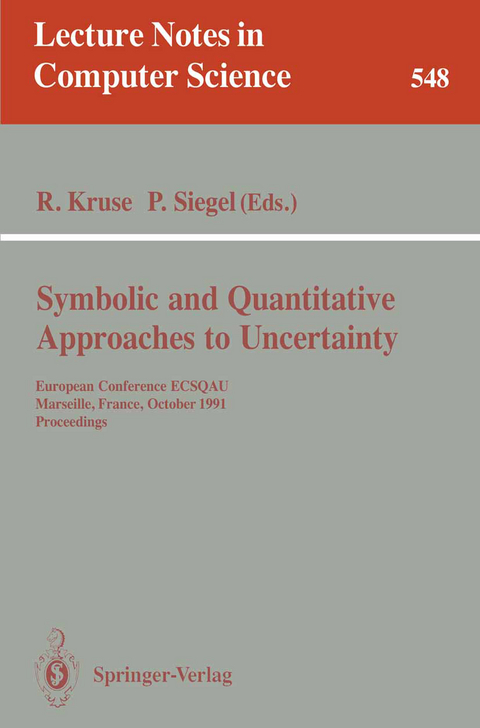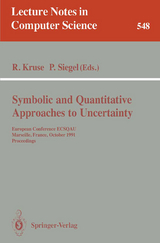Symbolic and Quantitative Approaches to Uncertainty
Prof. Dr. Rudolf Kruse ist Leiter des Lehrstuhls für Neuro-Fuzzy-Systeme an der Universität Magdeburg.
Abduction in labelled deductive systems a conceptual abstract.- Nonmonotonic inference, expectations, and neural networks.- Imprecise quantifiers and conditional probabilities.- Default logics.- Propagation of uncertainty in dependence graphs.- Efficient algorithms for belief functions based on the relationship between belief and probability.- A brief overview of possibilistic logic.- A modal analysis of possibility theory.- An extended logic language for representing belief.- Graded default logics.- Linguistically expressed uncertainty: Its elicitation and use in modular expert systems.- Reasoning with mass distributions and the context model.- Advance prototyping.- The transferable belief model.- Learning with CASTLE.- A New approach to inference under uncertainty for knowledge based systems.- Learning of uncertain classification rules in medical diagnosis.- Assertional default theories.- The reliability of reasoning with unreliable rules and propositions.- Uncertainty in the valuation of risky assets.- Assessment of qualitative judgements for conditional events in expert systems.- Automated reasoning about an uncertain domain.- Using defeasible logic for a window on a probabilistic database: Some preliminary notes.- From data analysis to uncertainty knowledge analysis.- Difference fuzzy relation equations: Studies in dynamical systems.- Towards a logic for a fuzzy logic controller.- Handling active databases with partial inconsistencies.- An extension of the possibility theory in view of the formalization of approximate reasoning.- Probabilistic regions of persistence.- Formalizing pertinence links in inheritance reasoning: Preliminary report.- A hybrid approach for modeling uncertainty in terminological logics.- Fuzzy control research at Siemens Corporate R&D.- Handling partially ordered defaults in TMS.- Computing extensions of default theories.- An evidential reasoning approach to the classification of satellite images.- PRESS-A probabilistic reasoning expert system shell.- Induction of uncertain rules and the sociopathicity property in Dempster-Shafer theory.- Hierarchical default logic.- A logic of imprecise monadic predicates and its relation to the S5-modal fuzzy logic.- Every complex system can be determined by a causal probabilistic network without cycles and every such network determines a Markov field.- Probabilistic default reasoning involving continuous variables.- Revision in propositional calculus.- A constraint-based approach to uncertain and imprecise reasoning. Application to expert systems.- Random closed sets: A unified approach to the representation of imprecision and uncertainty.- Knowledge extraction in trivalued propositional logic.- Using maximum entropy to identify unsafe assumptions in probabilistic expert systems.- On truth and utility.- On commitment and cumulativity in default logics.- A tableau-based characterisation for default logic.- Restraining the proliferation of worlds in probabilistic logic entailments.- Managing uncertainty in environmental analysis: An application to measurement data interpretation.- Handling uncertainty in knowledge-based computer vision.- Probabilistic reasoning with facts and rules in deductive databases.- An entity-relationship approach to the modelling of vagueness in databases.- A preferential model semantics for default logic.- Elementary hyperentailment.
| Erscheint lt. Verlag | 1.10.1991 |
|---|---|
| Reihe/Serie | Lecture Notes in Computer Science |
| Zusatzinfo | XII, 368 p. |
| Verlagsort | Berlin |
| Sprache | englisch |
| Maße | 155 x 233 mm |
| Gewicht | 624 g |
| Themenwelt | Informatik ► Theorie / Studium ► Kryptologie |
| Informatik ► Theorie / Studium ► Künstliche Intelligenz / Robotik | |
| Schlagworte | fuzzy • Fuzzy Mengen • Fuzzy Sets • Knowledge • Künstliche Intelligenz • Möglichkeitstheorie • Nicht-monotone Logik • Nonmonotonic Logic • Possibility Theory • Uncertainty • Ungewißheit • Unsicherheit • vagueness |
| ISBN-13 | 9783540546597 / 9783540546597 |
| Zustand | Neuware |
| Informationen gemäß Produktsicherheitsverordnung (GPSR) | |
| Haben Sie eine Frage zum Produkt? |
aus dem Bereich




